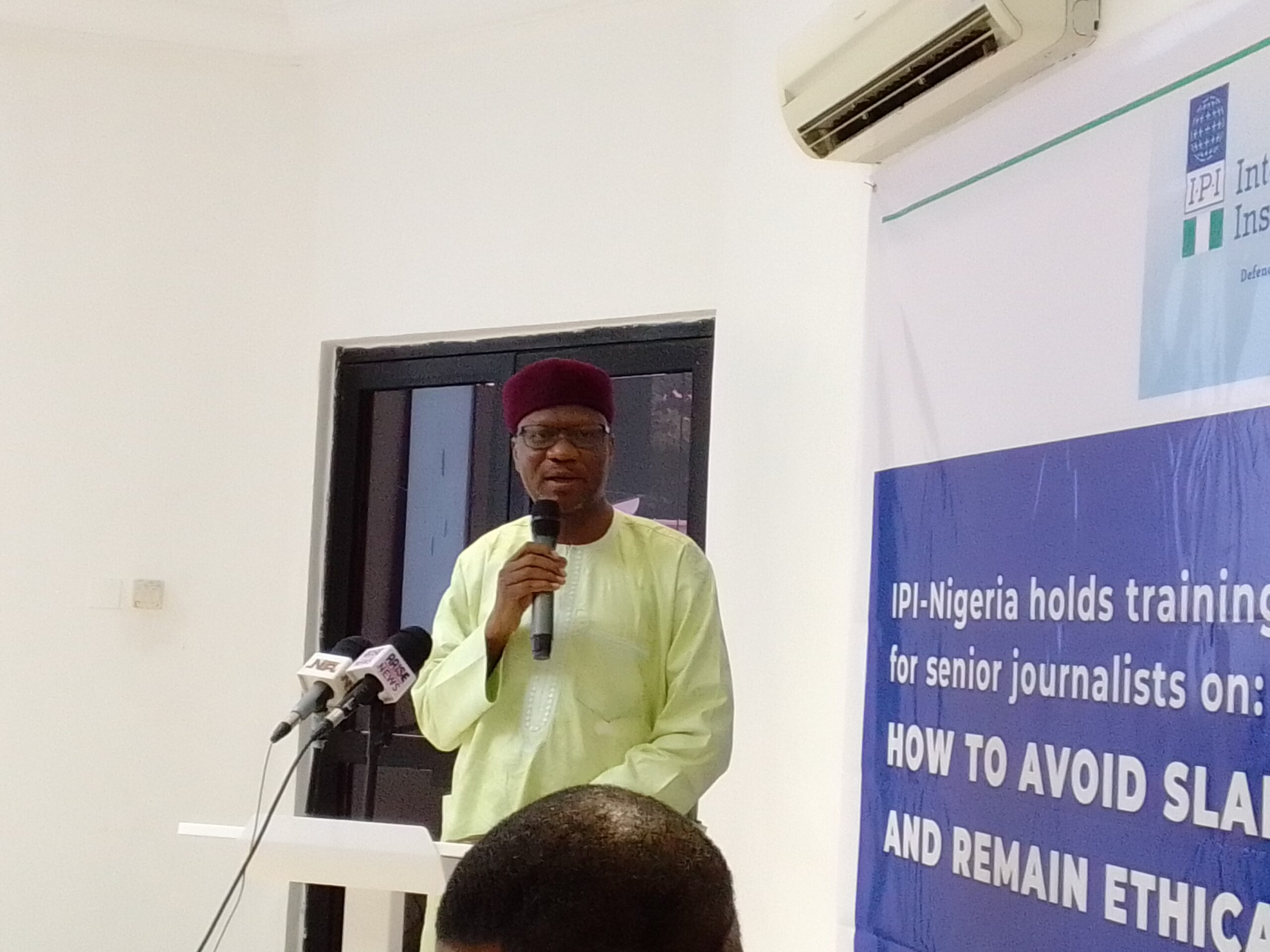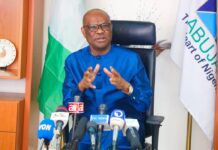(Photo: Dr Kole Shettima,MacArthur Foundation addressing participants)
By Danlami Nmodu
A two-day workshop for media executives on how to avoid Strategic Lawsuit Against Public Participation, SLAPP threats and ethical landmine was held last week in Abuja, Nigeria’s Federal Capital Territory (FCT). The thorough, brainstorming event scored the bull’s eye, as its engaging sessions sensitized media owners, editors and publishers to the reality and danger of SLAPP threats and ethical landmines.
The sessions began Wednesday with inspiring opening remarks by Malam Kabir Yusuf, Chairman Board of IPI Nigeria and Chieftain of Abuja-based Media Trust. While commending the efforts of IPI Nigeria under the leadership of Musikilu Mojeed, he urged participants to pay attention to ethical issues. He averred that while good journalism is necessary, it faces a lot of challenges.Yusuf urged journalists to be thorough, balanced and ethical.The IPI Nigeria board chairman admonished practitioners to be fair, balanced and avoid blackmail.
Musikilu Mojeed, editor-in-chief, Premium Times, President IPI Nigeria, while welcoming participants called on journalist to beware of SLAPP suits as much as possible because they are injurious to media business and could cause major distractions.
As the training commenced proper, it became evident to participants that governments, politicians, influential stakeholders , the rich and mighty often use these LSAPP lawsuits to undermine good journalism.
Even more, it didn’t take long before the participants realised as the sessions careened off that ethical conducts or misconduct could easily put journalists on head-on collision with SLAPP.
The very lively and interactive workshop was organised by International Press Institute (IPI Nigeria) with support from MacArthur Foundation and Primorg. Addressing the participants, Dr Kole Shettima,Africa Director MacArthur Foundation expressed his delight to witness the presence of media chiefs despite the challenge of the day: traffic snarl up amid election verdict challenge.He also identified the various areas MacArthur Foundation has be engaged in with the country over the years especially anti-corruption campaign and support for independent media among others.
While delivering his paper Mojeed said “Governments usually do not like critical media.They like media that act as their PR tools or megaphones. But they dislike media that hold them to account or exposes their misdeeds. They are consistently looking for excuses to crush you. Don’t give them the ammunition to crush you.
He warned that “any government can set traps for you or check through your records to detect violations”
Addressing the journalists on the issue of censorship, Mallam Garba Shehu, immediate past senior special assistant to former President Muhammadu Buhari on Media and publicity recalled that the Buhari government did not deliberately censor any media outfit. He said Buhari simply steered clear of media related issues perhaps, given his past experience. Of course, there were challenges which were handled by the professionals in government, he said.
Maxwell Kadiri, a civil society activist and lawyer and Tobi Soniyi of Arise News,legal adviser, IPI Nigeria, examined the legal implications and pitfalls to avoid.Kadiri especially urged media stakeholders to look beyond stories and seek ways of go the extra mile as media groups to prevent SLAPP issues ab initio. Soniyi identified defamation, plagiarism, copy right issues, contempt of court among other legal loopholes journalists must avoid.
Professor Abiodun Adeniyi of Baze University who addressed the audience on ethics and codes identified the various landmines to consider while handling a story.He urged writers to be fair balanced, and avoid defamation among others.He urge professionas to “ Report and interpret honestly, striving for accuracy, fairness and disclosure of all essential facts. Do not suppress relevant available facts, or give distorting emphasis. Do your utmost to give a fair opportunity for reply.
“Do not place unnecessary emphasis on personal characteristics, including race, ethnicity, nationality, gender, age, sexual orientation, family relationships, religious belief..
He identified defamation, privacy, accuracy of information, independence, copyright, the access and use of public records,third party comments and protecting sources,publication bans,conflicts of interest as ethical issues to be mindful about.
Yusuf Alli, managing editor, Northern operations, The Nation, took the participants through his difficult encounters with libel suits.He identified how to avoid them.His useful tips on how to win libel suits include: “Avoid frivolous, malicious and maligning stories Apply the “SIXTH SENSE”, evaluation of resources at your disposal; Learn to keep records: You must be tidier, keep every document, tape recorder, video clip, handwritten notes,have your eye on the ball and choose the right lawyer; Be courageous. Learn to stand alone; You also need war chest to fight your battle; Get a good lawyer because of technicalities; Have time for the turf; Learn a bit of libel law”
Edetaen Ojo navigated through the whole gamut of options available for journalists in need of legal aid. His address titled: “Dealing with Lawsuits:Available Helps” identified some partners that could be of help, such as the Joint Civic Defence Fund,MRA Legal assistance; Legal Aid from CJID, Public Interest Law Partners, Media Defense and Pan African Lawyers Union among others.
For Raheem Adedoyin, IPI Global Board member, the issues of censorship, media practitioners as consultants and ethics must be handled carefully so that integrity can be maintained. Earlier participants paid rapt attention as David Ajikobi,Country representative of Africa Check, took them through the rudiments of fact checking.He urged journalists to endevour to verify information always.
During the interactive sessions, journalists shared experiences with ethical and legal challenges and how they manoeuvred their ways through.
In the end, it was a robust, intellectually and professionally rewarding workshop with some participants overheard expressing their willingness to partner with resource persons for engagements with reporters in their various newsrooms.




